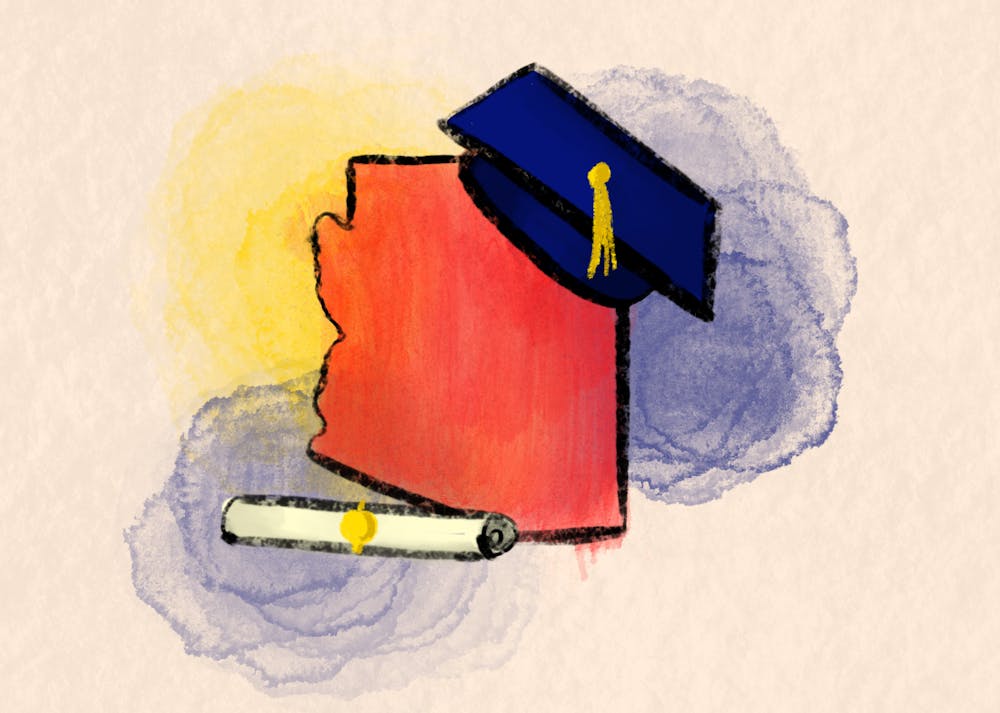To improve access to higher education and increase the predictability of its costs, the Arizona Board of Regents enacted a plan to estimate and limit tuition increases. It's a step in the transition to setting tuition as far as six years in advance, rather than as a year-by-year approval process.
At an executive board meeting on ASU's Tempe campus on Feb. 9, ABOR voted 8-1 to approve a new policy that will lock in the growth rate for increases in tuition and fees for six years starting in the 2024-25 academic year. Tuition for the 2023-24 academic year will be enacted through the same policy as in past years, which happens on a year-to-year basis.
Executive director of ABOR, John Arnold said this new policy provides transparency about tuition and fees for students and their families to properly plan for the future.
"The proposed policy is intended to create clear predictability for students and their families regarding the tuition that they will pay over the course of their college journeys by setting multiple-year maximum increases rather than making a year-to-year tuition determination," Arnold said at the meeting.
According to the ABOR meeting agenda, the growth rate will be revisited in the fourth year of each six-year cycle for a potential revision to extend the cycle for another four years. Tuition for both 2023-24 and the locked rate for 2024-25 and beyond will be decided in April 2023.
ABOR is also moving meetings and announcements of tuition from the spring to the fall every year in order to increase cooperation and communication with the state legislature and to have a more flexible policy with the money that higher education receives from the state.
The first locked-in rate for tuition and fee increases will be announced in Dec. 2023. This date also applies to housing and dining rate increases.
ASU, NAU and UA will be working with student governments and stakeholders before submitting the proposals to ABOR. The three university presidents will each present a plan to ABOR on November 15 of each year and will need to have consulted elected student leaders and members of the public before presenting their tuition and fee proposals.
The policy also says any new academic fees must be approved by ABOR before being enacted. The new policy also says undergraduate nonresident and international tuition cannot exceed four times the resident tuition rates.
These are welcome changes for students, who have seen tuition prices rise over the last decade. Last academic year, ASU President Michael Crow proposed a 2.5% increase in tuition for on-campus resident students, a 4% increase for non-resident students and a 5% increase for international students.
READ MORE: ASU tuition increase approved for the 2022-23 school year
"We'll be looking at what the specific tuition and fees for next year will be, as well as the maximum amount that ABOR will consider allowing them to grow in future years," said Brad Kendrex, the vice president and chief financial officer of ABOR.
The universities will not be allowed to exceed the maximum suggested price increases without approval from the board but can charge tuition and fees under the maximum locked-in rate.
The new tuition policy aligns with Gov. Katie Hobbs' goals for making high education more accessible in Arizona. In her State of the State address Hobbs said, "we must continue to improve access to these institutions for higher learning."
"Arizona's universities are incredible resources for our state’s residents and Governor Hobbs is committed to improving access to them," said Josselyn Berry, a spokesperson for Hobbs' office in an email.
The governor's office is willing to work with ABOR and the legislature to "ensure Arizona's higher education opportunities are the best in the nation," according to Berry.
Edited by Shane Brennan, Piper Hansen, Jasmine Kabiri and Caera Learmonth.
Reach the reporter at larisamay01@gmail.com and follow @larisamay01 on Twitter.
Like The State Press on Facebook and follow @statepress on Twitter.




